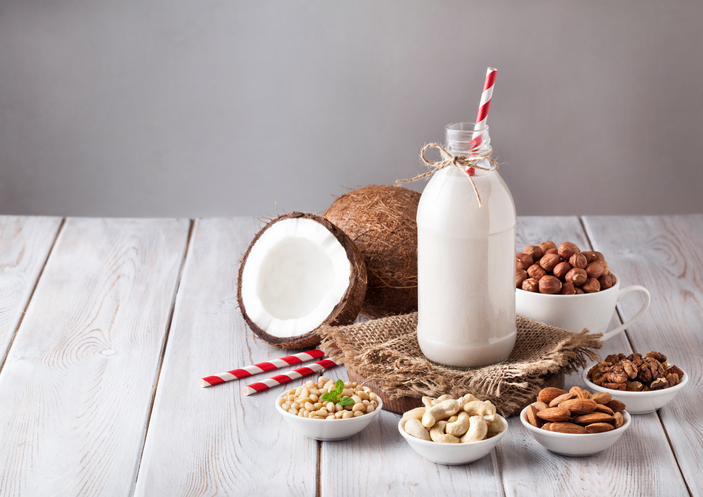Is Nut-Milk a Good Dairy-Alternative?
Why Nut Milk?
There are many reasons that someone may choose nut milk over animal-derived dairy milk. For some, it is a personal choice and, for others, it is a necessity. These include:
- Lactose intolerance or dairy allergy.
- Preference for plant-based milk because of a vegan or vegetarian lifestyle.
- Weight management. Most nut milk is lower in calories and carbohydrates than dairy.
- Obtain nutrients that may not be available in dairy milk including fiber, minerals, and vitamins.
- Longer shelf life. Many nut milk is available in packages that do not refrigeration until opened.
- Dislike the taste and texture of dairy milk.
- Fairly simple to make homemade nut milk.
Almond Milk
Almond milk is one of the most common dairy-free milk available. It is often found in both the refrigerated and non-perishable sections of the supermarket. It is a popular non-dairy option chosen by many and is often available in coffee houses and restaurants.
One cup of unsweetened almond milk contains no cholesterol or saturated fat, almost no carbohydrates (1.52 grams), and is low in calories – approx. 39 per serving. While almonds are naturally high in vitamins and minerals (especially vitamin E, manganese, and magnesium), often store-bought almond milk is also enriched with vitamin D and calcium to further boost its benefits. Almond milk is also rich in fiber, protein, and good fats.
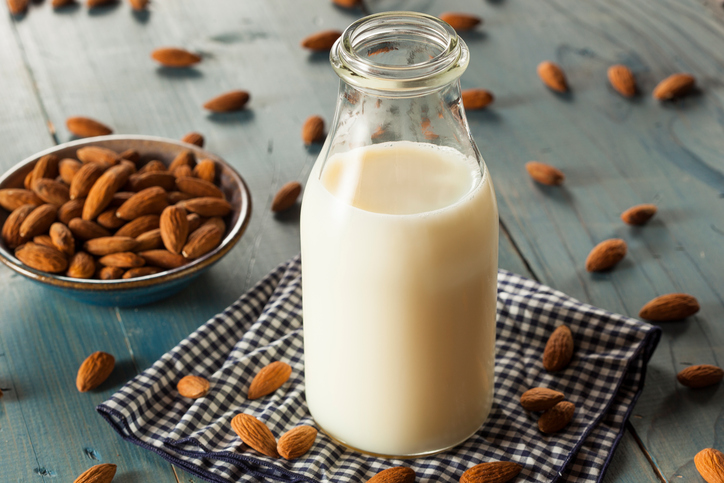
The benefits of almond milk include:
- Weight-loss – high in protein and low in calories.
- Blood Sugar – unsweetened almond milk doesn’t raise blood sugar levels.
- Bone Strength – when enriched with calcium, almond milk is comparable to the bone-strengthening properties of dairy milk.
- Heart health – 90% of the oil in almonds is unsaturated. The fatty acid in almond oil is oleic acid – linked to supporting normal blood lipid levels. (1)
Interested in making your own almond milk? It is easier than you think – try this recipe. People who regularly make their own almond milk swear that it tastes fresher, creamier, and more mellow than store-bought.
Note: If you are prone to kidney stones (almond milk contains a high calcium oxalate level) or need to stay away from carrageenan, then you should use caution when consuming almond milk.
Coconut Milk
OK, so coconut is not actually a nut, but a fruit. However, it is often thought to be a nut and is a very popular non-dairy option. Coconut milk is not the same as coconut water which comes from the center of a green coconut. Coconut milk comes from the liquid found inside fully ripened coconuts and is blended with the coconut pulp found inside. Often people enjoy coconut milk because it is creamy and naturally sweet.
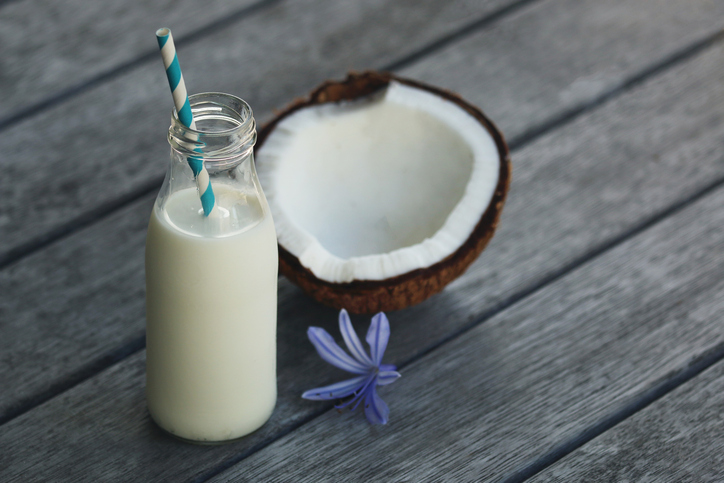
One cup of coconut milk contains 110.3 calories, which may seem high but most of those calories come from lauric acid, a healthy fat that has been found to be used as energy by the body since it is a medium-chain fatty acid. Coconut milk contains 7.1 net carbs and 1 g of protein per serving. In addition, it contains potassium, copper, iron, phosphorus, magnesium, and manganese. Please see the nutritional label of your store-bought coconut milk for any changes to this average. Some are mixed with coconut water or enriched with calcium, as well as sweetened and unsweetened.
The benefits of coconut milk include:
- Heart Health – Studies show that traditional use of coconut milk as a dietary supplement supports normal blood lipid levels. (2)
- Skin and Hair Health – the fatty acids in coconut milk can condition the skin and hair and help with dandruff, wound healing, and dry or itchy skin – because of the natural antiseptic properties it contains.
- Weight Loss – while high in calories, it is also high in healthy fats, which have been found to help your body feel full, increase metabolism and satiate appetites through receptors in the brain.
- Immune Booster – because of the lauric and capric acid, along with antimicrobial lipids; coconut milk contains antifungal, antiviral and antibacterial properties.
Pistachio Milk
While pistachios have a very long tradition as a favorite nut, as far back as 6,000 B.C., they tend to not be as popular as other nuts. While sometimes pistachio milk can be part of a combination with another milk, such as almond or hazelnut milk, it is often difficult to find it in stores. However, pistachio milk is something that you can make homemade and it can be worth the effort since it is raw food, gluten-free, and vegan.
Pistachio milk contains about 35 to 50 calories, 9g carbohydrates and 7 g of protein per a one-cup serving. It is also rich in both potassium and fiber, as well as other minerals and vitamins. Pistachio nuts are also a great source of healthy fats, including oleic acid.
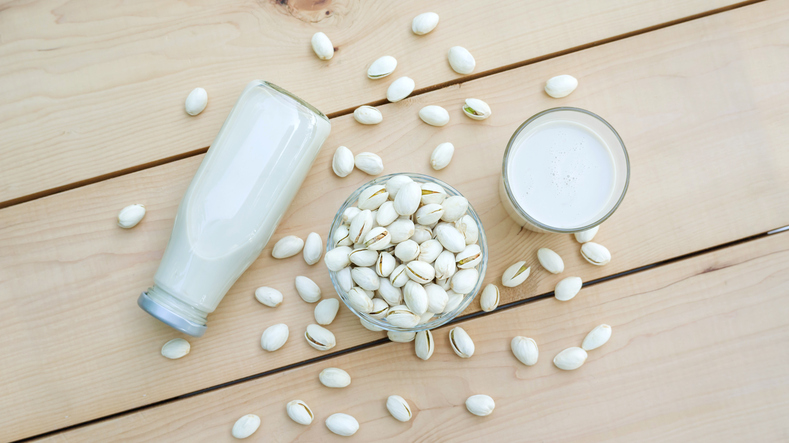
The benefits of pistachio milk include:
- Heart Health: Because they contain antioxidants and oleic acid they support normal cholesterol levels. In particular, researchers have found that they can decrease levels of LDL cholesterol. (3)
- Digestive Health: Rich in fiber, they can help with digestion and help with regularity. Just don’t eat too many at one time, they can also have a laxative effect!
- Weight Loss: Pistachios are one of the lowest-calorie nuts and are very low in carbs.
- Great source of minerals: These little green nuts contain calcium, selenium, iron, zinc, magnesium, potassium, phosphorus, manganese and copper.
- Aphrodisiac: Yes these nuts can also help in bed. Studies show that pistachios improved sexual health in men and supported normal erectile function. (4)
Cashew Milk
Cashew milk is fast becoming more popular nut milk in the last few years. People enjoy it because it tends to be super creamy and is packed with fiber that is beneficial to gut health. It is also packed with bioflavonoids and phytochemicals – the former helps to prevent cancer cells from dividing and the latter with heart health.
A half-cup of unsweetened cashew milk contains about 115 calories, 3g of protein, and 10 g carbohydrates. It is also rich in calcium, b vitamins, copper, iron, magnesium, and antioxidants.
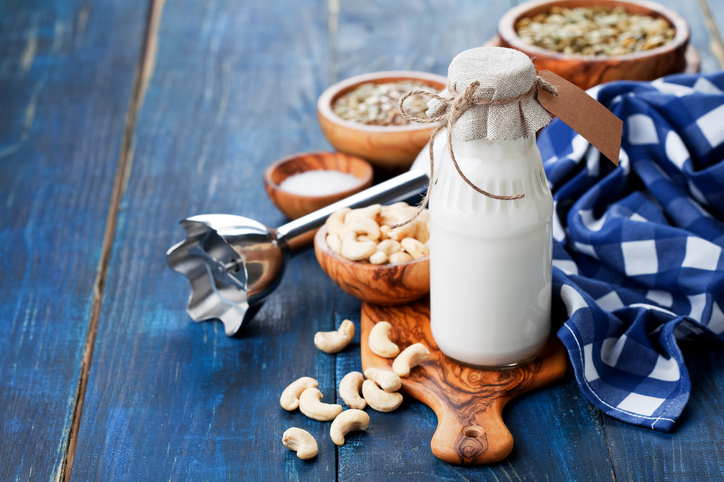
The benefits of cashew milk include:
- Heart Health: cashew nuts, as many other nuts, contain healthy fats – oleic acid – which help increase good cholesterol and support heart function. (3)
- Blood Sugar: there is no sugar in cashews, so from blood sugar levels to weight management – there are no worries.
- Skin: rich in vitamin E – cashews support skin health, as well as give some protection against sun damage.
- Making homemade cashew milk is pretty simple because it uses the whole nut and doesn’t need to be drained.
Homemade Cashew Milk Recipe
- Soak ¾ cup of raw cashews in a bowl with 3 cups cold water for a few hours or overnight.
- Place cashews and water in a blender. Add more water for thinner milk.
- Blend for 1-2 minutes in a blender, until smooth.
- Add a dash of sweetener, vanilla, or cocoa powder to taste, optional.
How to Use Nut Milks
You can use nut milk in many ways including:
- Mix it in your smoothie or smoothie bowl.
- Add to your coffee or tea.
- Make ice-cream or pudding.
- Use it in recipes that call for dairy milk including soups, sauce or desserts.
- Use it in your next bowl of cereal or oatmeal.
Whichever nut milk you choose, it is apparent that nut milk can offer as many nutritional benefits as traditional dairy milk can, if not more. They are generally lower in calories and high in healthy fats. They can be beneficial to many people who cannot, or do not want, to consume dairy.
They can also be a great choice for those watching their blood sugar, attempting weight loss, or wish to consume more vitamins and minerals. Most types of nut milk are easy to make yourself at home and some are readily available at many supermarkets and coffee shops. You can also find nut milk-based yogurts, cheeses and ice creams.
Occasionally crave a glass of cow’s milk, but you’re sensitive? Try Gluten/Dairy Digest. This supplement contains a unique blend of protease enzymes that can help with the digestion of dairy products.
Reference
1 Adv Nutr. 2015 Nov 13;6(6):674-93. doi: 10.3945/an.115.008979. Print 2015 Nov.
2 R. A. I. Ekanayaka, N. K. Ekanayaka, B. Perera, and P. G. S. M. De Silva, “Impact of a Traditional Dietary Supplement with Coconut Milk and Soya Milk on the Lipid Profile in Normal Free Living Subjects,” Journal of Nutrition and Metabolism, vol. 2013, Article ID 481068, 11 pages, 2013. doi:10.1155/2013/481068
3 Am J Clin Nutr. 2015 Dec;102(6):1347-56. doi: 10.3945/ajcn.115.110965. Epub 2015 Nov 11.
4 Int J Impot Res. 2011 Jan-Feb;23(1):32-8. doi: 10.1038/ijir.2010.33. Epub 2011 Jan 13.

Jemile earned a degree in Food Studies and Writing and has worked for almost 23 years in the medical and health industries. She has been a digital marketing consultant for Acupuncture Atlanta since 2011 as the social media manager and content manager. Writing has been a childhood dream for Jemile and writing daily for clients in the health, wellness, food, and art industries have been phenomenal. Jemile is originally from Brooklyn, NY, and lives in the Hudson Valley, NY. She lives with her husband, two daughters, her dog, and two fish. You can contact Jemile via Linkedin, her mom blog, or her website, lunaroseconsulting.com
